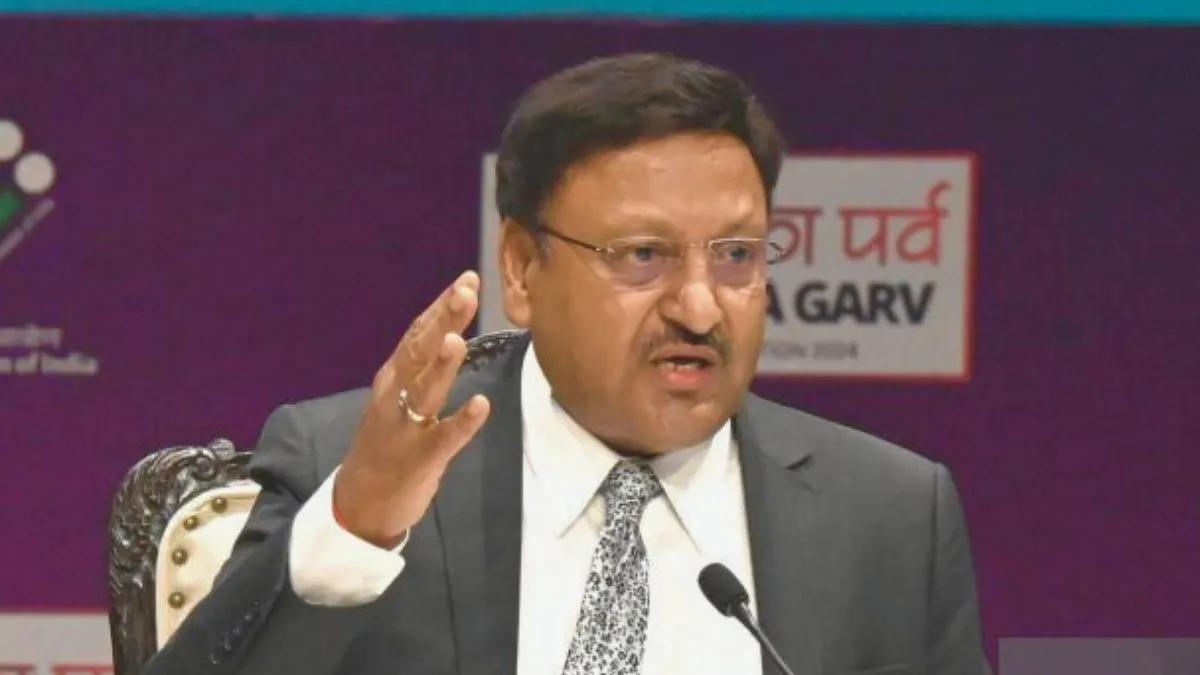Rajiv Kumar Retires as CEC – Timing of Allegations and Petitions
One of the key concerns raised by Rajiv Kumar was the timing of various petitions and allegations against the Election Commission. He questioned why doubts over electoral processes were often raised right before elections, suggesting that such actions aimed to discredit the Commission and the democratic process itself.
Kumar observed a “pattern in the timing of certain narratives,” where legal challenges, especially those questioning electoral fairness, would surface at critical moments. He urged that judicial proceedings on election-related matters be scheduled in a way that does not disrupt ongoing elections. This, according to him, would help maintain trust in the electoral process and prevent unnecessary skepticism among voters.
Rajiv Kumar Chief Election Commissioner of India
The Issue of Freebies in Elections
A major debate during Kumar’s tenure was the issue of political parties offering “freebies” in their election manifestos. He repeatedly emphasized the need for transparency in political promises, urging parties to disclose how they plan to fund such benefits without jeopardizing the state’s financial stability.
Although the matter is currently sub-judice, Kumar voiced concerns about unrealistic promises affecting governance. He argued that unchecked freebies could have long-term economic consequences and advocated for mandatory financial disclosures in election manifestos.

The COVID-19 Controversy and Election Commission’s Role
Kumar’s tenure also included one of the most challenging periods in recent history—the COVID-19 pandemic. In 2021, when elections were conducted amid a deadly surge, the Madras High Court blamed the Election Commission for being “singularly responsible” for the crisis in Tamil Nadu.
In response, Kumar, then an Election Commissioner, had prepared an affidavit stating that if he were found guilty, the courts should punish him but absolve the EC as an institution. However, this affidavit was never officially submitted. His stance demonstrated his willingness to personally take responsibility while shielding the integrity of the Election Commission.
Views on Exit Polls and Media Influence
Kumar was vocal about his disapproval of how exit polls and early vote counting trends were reported by the media. He criticized news channels for broadcasting speculative results before the final tally, calling it “nonsense” and an unnecessary distraction.
He highlighted the need for media organizations to adopt responsible reporting, ensuring that exit poll results were based on transparent methodologies rather than sensationalism. Kumar urged introspection among journalists and news agencies, emphasizing the need for accuracy in electoral reporting.
ALSO READ: PM Narendra Modi Arrives in the US for Quad Summit, Bilateral Meeting with President Biden
Kumar’s Administrative and Bureaucratic Career Before the EC
Before joining the Election Commission, Kumar had a distinguished bureaucratic career. Some of his key roles included:
- Chairman, Public Enterprises Selection Board (April–August 2020): Oversaw appointments in top public sector enterprises.
- Union Finance Secretary (July 2019–February 2020): Played a crucial role in shaping India’s financial policies.
- Secretary, Financial Services (September 2017–July 2019): Managed banking and insurance reforms.
- Establishment Officer (March 2015–June 2017): Responsible for administrative policies and governance frameworks.
An IAS officer from the 1984 batch (Bihar/Jharkhand cadre), Kumar retired from government service in February 2020 before transitioning to the Election Commission.
Delimitation of Constituencies in Assam
One of Kumar’s significant contributions as CEC was overseeing the delimitation of parliamentary and assembly constituencies in Assam. This process aimed to ensure fair representation based on population changes and shifting demographics.
Despite conflicting viewpoints among political parties, Kumar led a participatory approach, ensuring that all stakeholders had a say in the new constituency boundaries. His efforts were widely recognized for fostering transparency and inclusivity in the process.
Conclusion
Rajiv Kumar’s tenure as Chief Election Commissioner was marked by a blend of achievements and controversies. His commitment to electoral reforms, technological advancements, and transparency significantly contributed to India’s democratic framework. However, his tenure also faced criticism over alleged biases, media influence, and voter data concerns.
As he steps away from his role, his decision to retreat to the Himalayas signals a departure from the usual post-retirement trajectory of bureaucrats. Whether viewed as a reformist or a controversial figure, his impact on India’s electoral system will be remembered for years to come.
ALSO READ: PM Internship Scheme; Good Response 6.21 Lakh Applicants
FAQs
1. What were Rajiv Kumar’s major achievements as CEC?
Rajiv Kumar implemented electoral reforms, strengthened technological advancements, improved voter communication, and successfully conducted Lok Sabha and state elections, including those in Jammu and Kashmir.
2. Why was Rajiv Kumar accused of bias by opposition parties?
Opposition parties alleged that he favored the ruling BJP, particularly in matters related to Electronic Voting Machines (EVMs) and voter data handling. However, Kumar and the EC consistently denied these allegations.
3. What electoral reforms did Rajiv Kumar implement?
He introduced digital enhancements in election management, improved transparency in voter registration, and facilitated better communication between the EC and political stakeholders.
4. How did Kumar respond to criticism during his tenure?
Kumar used poetry and public statements to defend the Election Commission, arguing that accusations were politically motivated. He also criticized the timing of petitions questioning electoral processes.
5. What are his post-retirement plans?
Rajiv Kumar announced that he would spend six months in the Himalayas, distancing himself from public life to “detoxify” after his tenure as Chief Election Commissioner.

